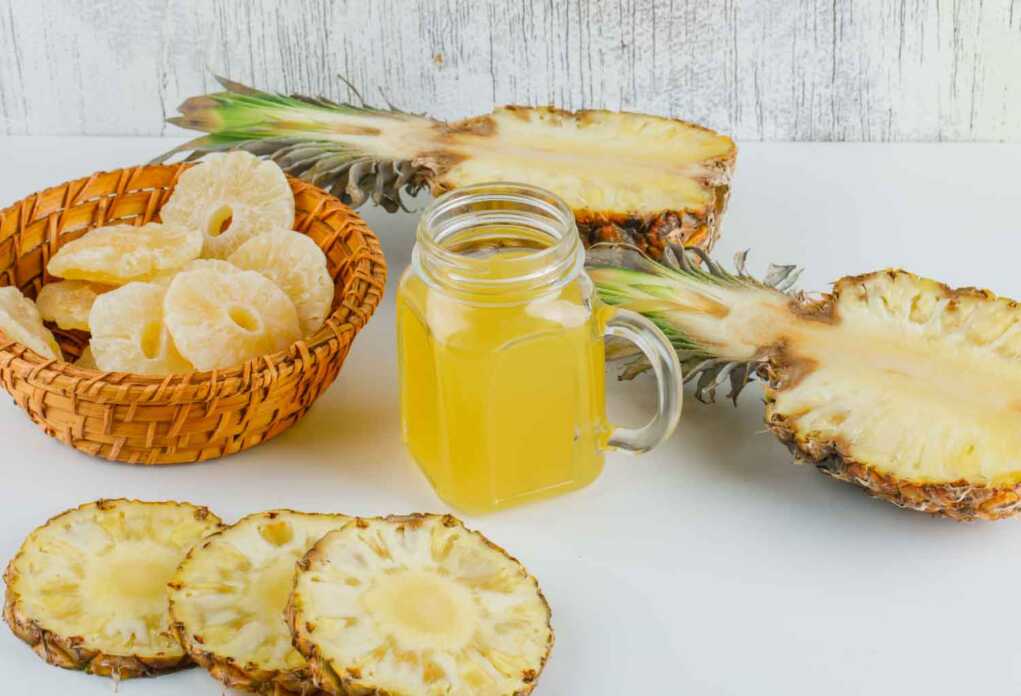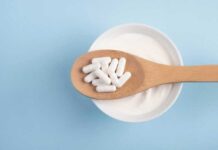
Bromelain is a mixture of enzymes found naturally in the juice and stems of the pineapple plant (Ananas comosus). It’s generally considered safe but is not recommended for certain groups, such as people who are pregnant or have liver or kidney disorders.
Available in dietary supplement form, bromelain is considered a proteolytic enzyme, a class of enzymes that aid in the breakdown of protein. Bromelain supplements are marketed for a variety of health conditions, especially those associated with chronic inflammation, such as:
- Allergies
- Osteoarthritis
- Sinusitis
- Ulcerative colitis1
Bromelain has also been looked at for postsurgical use for third-molar (wisdom tooth) removal and topically for removing dead skin from burns. However, there is not enough evidence to support the use of bromelain for most conditions.2
This article will review the uses of bromelain and what to look for if bromelain is recommended for you.
Dietary supplements are not regulated the way drugs are in the United States, meaning the Food and Drug Administration (FDA) does not approve them for safety and effectiveness before products are marketed. When possible, choose a supplement tested by a trusted third party, such as USP (U.S. Pharmacopeia), ConsumerLab, or NSF.
However, even if supplements are third-party tested, that doesn’t mean they are necessarily safe for all or effective in general. Therefore, it is important to talk to your healthcare provider about any supplements you plan to take and check in about potential interactions with other supplements or medications.
Supplement Facts
- Active ingredient(s): Bromelain
- Alternate name(s): Ananas comosus, pineapple enzyme, pineapple extract
- Suggested dose: No standard dose; discuss with a healthcare provider
- Safety considerations: Avoid when pregnant or breastfeeding, or when also taking blood-thinning medications
Uses of Bromelain
Supplement use should be individualized and vetted by a healthcare professional, such as a registered dietitian, pharmacist, or healthcare provider. No supplement is intended to treat, cure, or prevent disease.
Research regarding the benefits of bromelain is limited. Here’s a look at several findings from the available research on the potential uses of bromelain.
Sinusitis
A few studies have documented some benefits of bromelain supplementation for sinusitis:
- A review of 10 randomized control trials reported that, when used with standard medications, bromelain may help relieve sinus inflammation.3
- Another review of studies reported that bromelain may improve symptoms associated with sinusitis such as difficulty breathing and nasal inflammation.4
- The most recent systematic review of alternative therapies for sinusitis concluded that bromelain showed some promise but that studies are still needed to compare bromelain to standard therapy.5
Still, the research is limited overall and is not enough to recommend bromelain’s use for sinusitis.
Pain Relief
Laboratory studies show that bromelain reduces the levels of some substances that cause inflammation from arthritis, but results from clinical trials are mixed.
Knee Pain
So far, studies testing bromelain’s effects on knee pain have yielded mixed results.
In one small study, for example, bromelain supplements appeared to be no more effective than a placebo in alleviating symptoms such as pain and stiffness in people with knee osteoarthritis.6
However, other research suggests that daily oral supplementation of bromelain works well for reducing knee pain and stiffness from osteoarthritis.7
Surgical Pain
Research has looked at whether oral bromelain is effective in reducing pain, swelling, and healing time following oral surgery. However, its effectiveness has been found to vary from person to person and in different tissues in the body.
Four different systematic reviews (detailed reviews of articles focusing on answering a single question) evaluated bromelain for use after third-molar surgeries. The studies indicated that bromelain appeared to offer moderate pain relief after surgery.8.9 However, the results on whether it controlled swelling were mixed.10.11
Wound Healing
The topical use of bromelain has been investigated for its effects on burn wounds. Surgical excision remains the standard of care for burn wound debridement (removal of burned tissue), but there is some evidence that topical bromelain may reduce the amount of excision needed.12
It should be noted that this treatment is done under medical supervision and only for burn wounds that require hospitalization. This does not apply to oral supplementation of bromelain.
Eye Floaters
A group of researchers is studying an oral bromelain supplement and its effectiveness for treating eye floaters. In one study, participants with floaters were given varying daily dosages of a supplement containing the enzymes bromelain, papain, and ficin. After three months, 12 of the 40 participants taking the highest supplement dose reported having floaters, while 38 of the 40 participants who were given a placebo (vitamin C) reported having floaters.13
Additional research is needed to understand the mechanism by which these enzymes can affect eye floaters, but the researchers believe it may be caused by the enzymes’ ability to break down collagen found in the vitreous fluid of the eye.
Digestive Issues
Enzymes are needed for some digestive problems, including diseases that involve the pancreas. People with cystic fibrosis (CF) or exocrine pancreatic insufficiency (EPI) may rely on enzyme replacement for digestion. However, they require multiple types of enzymes, not just proteolytic enzymes like bromelain. Additionally, these enzymes are prescribed and monitored carefully by your healthcare provider.
There are no clinical trials in humans evaluating the effects of bromelain alone in bowel disease. If you have digestive problems, be sure to discuss them with a gastroenterologist or your healthcare provider.
Cancer
There is not enough evidence to support the use of bromelain supplementation for cancer. A 2021 systematic review analyzed 15 studies and found no clear benefit from proteolytic enzymes as an adjuvant (add-on) treatment for cancer.14
Muscle Soreness
There is insufficient research to support using bromelain for muscle soreness. Research has been conflicting.
An older, preliminary study evaluated the use of bromelain, ibuprofen, or placebo for delayed onset muscle soreness of the elbow flexors after an intense exercise regimen. No differences were noted between treatment groups, and neither bromelain nor ibuprofen (the main ingredient in Advil and Motrin) had a positive effect on pain or reduced range of motion following an exercise regimen.15
A newer study from 2016, however, found that a group of cyclists who took bromelain had less muscle fatigue after days of cycling than a group that took a placebo.16
What Are the Side Effects of Bromelain?
Side effects commonly associated with bromelain include diarrhea and upset stomach.17
In certain people, bromelain may trigger allergic reactions and asthma symptoms, such as breathing problems, tightness in the throat, hives, rash, and itchy skin. You should avoid bromelain supplementation if you are sensitive or allergic to pineapples. You may also be susceptible to an allergic reaction if you have an allergy to:18
- Carrots
- Celery
- Fennel
- Rye
- Papaya
- Birch
- Cypress pollen
- Certain grasses
- Latex
If you experience any of these symptoms, stop taking bromelain.
Precautions
Bromelain supplements are not recommended for use for people who are:18
- Sensitive or allergic to pineapples
- Pregnant or breastfeeding
- Have peptic ulcers or other digestive problems
- Undergoing surgery, as it may increase the risk of bleeding
- Taking blood thinners, such as Jantoven (warfarin), Lovenox (heparin), or aspirin, or supplements like ginkgo biloba
- Diagnosed with liver or kidney disorders
Dosage: How Much Bromelain Should I Take?
Always speak with a healthcare provider before taking a supplement to ensure that the supplement and dosage are appropriate for your individual needs.
Eating large amounts of pineapple will not give the same effect as taking a bromelain supplement. Bromelain is primarily found in the stem of the pineapple, which is not normally eaten.
When used as a digestive aid, bromelain is typically taken with meals. When used for inflammatory conditions, it’s often taken between meals on an empty stomach to maximize absorption.
There is no standardized dose of bromelain. Doses are discussed in milligrams or enzyme activity units, known as milk clotting units (MCU) or gelatin dissolving units (GDU). Before starting bromelain, ask your healthcare provider or pharmacist about the right dosage for you. Make sure to read the product label for instructions on its use.
It should also be noted that avoiding or delaying standard care and self-treating a chronic condition with bromelain supplements may have serious consequences. Talk to your healthcare provider if you are considering using bromelain for any condition.
What Happens if I Take Too Much Bromelain?
Based on animal studies, bromelain is thought to have low toxicity.19 However, taking more bromelain than recommended may increase the likelihood of experiencing side effects, such as:18
- Nausea
- Vomiting
- Diarrhea
- Indigestion
- Rapid heartbeat
- Uterine bleeding
- Heavy menstruation
To prevent toxicity, follow your healthcare provider’s advice on how to take bromelain safely.
Interactions
Since bromelain may slow blood clotting, using it in combination with prescribed blood thinners could increase the risk of bleeding and bruising. These can include:18
- Jantoven (warfarin)
- Plavix (clopidogrel)
- Nonsteroidal anti-inflammatory drugs (NSAIDs), such as Advil (ibuprofen) and Naprosyn (naproxen)
- Aspirin
Similarly, use caution with supplements that also have a bleeding risk, such as garlic and ginkgo biloba.18
Bromelain may also increase the absorption of certain antibiotics, such as tetracycline and amoxicillin, which can increase their side effects.18
Bromelain may also increase the strength of sedatives, such as barbiturates, antiseizure medications (Dilantin), insomnia medication (Ambien and Lunesta), and benzodiazepines (Xanax and Valium).20
Before starting bromelain, tell your healthcare provider about any medicines you are taking or plan to take, including prescription and over-the-counter (OTC) drugs, vitamins, and herbal supplements.
It is essential to carefully read the ingredient list and nutrition facts panel of a supplement to know which ingredients and how much of each ingredient is included. Please review this supplement label with your healthcare provider to discuss any potential interactions with foods, other supplements, and medications.
How to Store Bromelain
Store Bromelain supplements in a cool and dry place. Supplements and medications should always be kept out of reach of children.
How to Find Quality Forms of Bromelain
Bromelain supplements are sold as powders, creams, tablets, or capsules, either alone or in combination with other ingredients. Bromelain may also be found as a single ingredient or in combined products marketed for digestive health that provide multiple types of enzymes.
Since bromelain is an enzyme, the label should list the amount of enzyme activity in units, as well as its quantity in mass.21
When choosing a supplement, look for products that have been certified by third-party authorities like ConsumerLab, USP, or NSF International. These certifying bodies ensure that supplements are pure and contain just the ingredients listed on the product label.
Summary
Bromelain is an enzyme found naturally in the juice and stems of pineapples that plays a role in protein breakdown. As a supplement, some research shows that it may help reduce pain and inflammation in some conditions. However, there is not enough high-quality evidence to recommend it for these uses.
Taken alone, it is not likely to help with digestive problems. Although marketed for several other health conditions, there is not enough evidence to support these claims.
Before starting to take any new supplements, talk to your healthcare provider to be sure the supplement is appropriate and safe for you to take.
Sources:
- Bottega R, Persico I, De Seta F, Romano F, Di Lorenzo G. Anti-inflammatory properties of a proprietary bromelain extract (Bromeyal) after in vitro simulated gastrointestinal digestion. Int J Immunopathol Pharmacol. 2021;35:205873842110346. doi:10.1177/20587384211034686
- Chakraborty AJ, Mitra S, Tallei TE, et al. Bromelain a potential bioactive compound: a comprehensive overview from a pharmacological perspective. Life. 2021;11(4). doi:10.3390/life11040317
- Passali D, Passali GC, Bellussi LM, et al. Bromelain’s penetration into the blood and sinonasal mucosa in patients with chronic rhinosinusitis. Acta Otorhinolaryngol Ital. 2018;38(3):225-228. doi:10.14639/0392-100X-1693
- Rathnavelu V, Alitheen NB, Sohila S, Kanagesan S, Ramesh R. Potential role of bromelain in clinical and therapeutic applications. Biomed Rep. 2016;5(3):283-288. doi:10.3892/br.2016.72
- Wu AW, Gettelfinger JD, Ting JY, Mort C, Higgins TS. Alternative therapies for sinusitis and rhinitis: a systematic review utilizing a modified Delphi method. Int Forum Allergy Rhinol. 2020;10(4):496-504. doi:10.1002/alr.22488
- Pothacharoen P, Chaiwongsa R, Chanmee T, et al. Bromelain extract exerts antiarthritic effects via chondroprotection and the suppression of tnf-α–induced nf-κb and mapk signaling. Plants. 2021;10(11):2273. doi:10.3390/plants10112273
- Henrotin YE, Michlmayr C, Rau SM, Quirke AM, Bigoni M, Ueberall MA. Combination of enzymes and rutin to manage osteoarthritis symptoms: lessons from a narrative review of the literature. Rheumatol Ther. 2022;9(5):1305-1327. doi:10.1007/s40744-022-00472-7
- Liu S, Zhao H, Wang Y, Zhao H, Ma C. Oral bromelain for the control of facial swelling, trismus, and pain after mandibular third molar surgery: a systematic review and meta-analysis. J Oral Maxillofac Surg. 2019;77(8):1566-1574. doi:10.1016/j.joms.2019.02.044
- Mendes ML, do Nascimento-Júnior EM, Reinheimer DM, Martins-Filho PR. Efficacy of proteolytic enzyme bromelain on health outcomes after third molar surgery. Systematic review and meta-analysis of randomized clinical trials. Med Oral Patol Oral Cir Bucal. 2019;24(1):e61-e69. doi:10.4317/medoral.22731
- de Souza GM, Fernandes IA, Dos Santos CRR, Falci SGM. Is bromelain effective in controlling the inflammatory parameters of pain, edema, and trismus after lower third molar surgery? A systematic review and meta-analysis. Phytother Res. 2019;33(3):473-481. doi:10.1002/ptr.6244
- de A C Almeida R, de Sousa Lima FCM, do E Vasconcelos BC. Is bromelain an effective drug for the control of pain and inflammation associated with impacted third molar surgery? Systematic review and meta-analysis. Int J Oral Maxillofac Surg. 2019;48(5):651-658. doi:10.1016/j.ijom.2018.07.028
- Salehi SH, Momeni M, Vahdani M, Moradi M. Clinical value of debriding enzymes as an adjunct to standard early surgical excision in human burns: a systematic review. J Burn Care Res. 2020;41(6):1224-1230. doi:10.1093/jbcr/iraa074
- Ma JW, Hung JL, Takeuchi M, Shieh PC, Horng CT. A New Pharmacological Vitreolysis through the Supplement of Mixed Fruit Enzymes for Patients with Ocular Floaters or Vitreous Hemorrhage-Induced Floaters. J Clin Med. 2022 Nov 13;11(22):6710. doi: 10.3390/jcm11226710
- Gremmler L, Kutschan S, Dörfler J, Büntzel J, Büntzel J, Hübner J. Proteolytic enzyme therapy in complementary oncology: a systematic review. Anticancer Res. 2021;41(7):3213-3232. doi:10.21873/anticanres.15108
- Stone MB, Merrick MA, Ingersoll CD, Edwards JE. Preliminary comparison of bromelain and Ibuprofen for delayed onset muscle soreness management. Clin J Sport Med. 2002;12(6):373-378. doi:10.1097/00042752-200211000-00009
- Shing, C. M., Chong, S., Driller, M. W., & Fell, J. W. (2015). Acute protease supplementation effects on muscle damage and recovery across consecutive days of cycle racing. European Journal of Sport Science, 16(2), 206–212. https://doi.org/10.1080/17461391.2014.1001878
- Chakraborty AJ, Mitra S, Tallei TE, et al. Bromelain a potential bioactive compound: a comprehensive overview from a pharmacological perspective. Life. 2021;11(4):317. doi:10.3390/life11040317
- Chakraborty AJ, Mitra S, Tallei TE, et al. Bromelain a potential bioactive compound: a comprehensive overview from a pharmacological perspective. Life (Basel). 2021;11(4):317. doi:10.3390/life11040317
- Hikisz P, Bernasinska-Slomczewska J. Beneficial properties of bromelain. Nutrients. 2021;13(12):4313. doi: 10.3390/nu13124313
- St. Luke’s Hospital. Bromelain.
- Council for Responsible Nutrition and the Enzyme Technical Association. Best practices guide enzyme dietary supplement products.
Additional Reading
- Ameye LG, Chee WS. Osteoarthritis and nutrition. From nutraceuticals to functional foods: a systematic review of the scientific evidence. Arthritis Res Ther. 2006;8(4): R127.
- Baez R, Lopes MT, Salas CE, Hernandez M. In vivo antitumoral activity of stem pineapple (Ananas comosus) bromelain. Planta Med. 2007 Oct;73(13):1377-83.
- Braun JM, Schneider B, Beuth HJ. Therapeutic use, efficiency and safety of the proteolytic pineapple enzyme Bromelain-POS in children with acute sinusitis in Germany. In Vivo. 2005;19:417–421.
- Brien S, Lewith G, Walker A, Hicks SM, Middleton D. Bromelain as a Treatment for Osteoarthritis: a Review of Clinical Studies. Evid Based Complement Alternat Med. 2004 Dec;1(3):251-257.
- Brien S1, Lewith G, Walker AF, Middleton R, Prescott P, Bundy R. Bromelain as an adjunctive treatment for moderate-to-severe osteoarthritis of the knee: a randomized placebo-controlled pilot study. QJM. 2006 Dec;99(12):841-50.
- Buttner L, et al. Efficacy and tolerability of bromelain in patients with chronic rhinosinusitis—a pilot study. B-ENT. 2013;9(3):217-25.
- Chobotova K1, Vernallis AB, Majid FA. Bromelain’s activity and potential as an anti-cancer agent: Current evidence and perspectives. Cancer Lett. 2010 Apr 28;290(2):148-56.
- Dhandayuthapani S1, Perez HD, Paroulek A, Chinnakkannu P, Kandalam U, Jaffe M, Rathinavelu A. Bromelain-induced apoptosis in GI-101A breast cancer cells. J Med Food. 2012 Apr;15(4):344-9.
- Guo R, Canter PH, Ernst E. Herbal medicines for the treatment of rhinosinusitis: a systematic review. Otolaryngol Head Neck Surg. 2006 Oct;135(4):496-506.
- Hale LP1, Greer PK, Trinh CT, Gottfried MR. Treatment with oral bromelain decreases colonic inflammation in the IL-10-deficient murine model of inflammatory bowel disease. Clin Immunol. 2005 Aug;116(2):135-42.
- Memorial Sloan Kettering Cancer Center. Bromelain.
- National Center for Complementary and Integrative Health. Bromelain.
- Onken JE, Greer PK, Calingart B, Hale LP. Bromelain treatment decreases secretion of pro-inflammatory cytokines and chemokines by colon biopsies in vitro. Clin Immunol. 2008 Mar;126(3):345-52. Epub 2007 Dec 21.
- Pavan R1, Jain S, Shraddha, Kumar A. Properties and therapeutic application of bromelain: a review. Biotechnol Res Int. 2012;2012:976203.
- Rathnavelu Vidhya, et al. Potential role of bromelain in clinical and therapeutic applications. Biomed Rep. 2016 Sep; 5(3): 283–288.
- Rosenberg L, Shoham Y, Krieger Y, et al. Minimally invasive burn care: a review of seven clinical studies of rapid and selective debridement using a bromelain-based debriding enzyme (Nexobrid). Ann Burns Fire Disasters. 2015 Dec 31;28(4):264-274.
- Ryan RE. A double-blind clinical evaluation of bromelains in the treatment of acute sinusitis. Headache. 1967;7:13-17.
- Secor ER Jr1, Shah SJ, Guernsey LA, Schramm CM, Thrall RS. Bromelain limits airway inflammation in an ovalbumin-induced murine model of established asthma. Altern Ther Health Med. 2012 Sep-Oct;18(5):9-17.
- Tejpal Singh, Vinayak More, Umayra Fatima, Tanveer Karpe, Mohammed A. Aleem, J. Prameela. Effect of proteolytic enzyme bromelain on pain and swelling after removal of third molars. J Int Soc Prev Community Dent. 2016 Dec; 6(Suppl 3): S197–S204.
- Walker AF1, Bundy R, Hicks SM, Middleton RW. Bromelain reduces mild acute knee pain and improves well-being in a dose-dependent fashion in an open study of otherwise healthy adults. Phytomedicine. 2002 Dec;9(8):681-6.
Important Notice: This article was originally published at www.verywellhealth.com by Jennifer Lefton, MS, RD/N, CNSC, FAND where all credits are due. Medically reviewed by Elizabeth Barnes, RDN. Originally written by Cathy Wong.
Disclaimer
The watching, interacting, and participation of any kind with anything on this page does not constitute or initiate a doctor-patient relationship with Dr. Farrah™. None of the statements here have been evaluated by the Food and Drug Administration (FDA). The products of Dr. Farrah™ are not intended to diagnose, treat, cure, or prevent any disease. The information being provided should only be considered for education and entertainment purposes only. If you feel that anything you see or hear may be of value to you on this page or on any other medium of any kind associated with, showing, or quoting anything relating to Dr. Farrah™ in any way at any time, you are encouraged to and agree to consult with a licensed healthcare professional in your area to discuss it. If you feel that you’re having a healthcare emergency, seek medical attention immediately. The views expressed here are simply either the views and opinions of Dr. Farrah™ or others appearing and are protected under the first amendment.
Dr. Farrah™ is a highly experienced Licensed Medical Doctor certified in evidence-based clinical nutrition, not some enthusiast, formulator, or medium promoting the wild and unrestrained use of nutrition products for health issues without clinical experience and scientific evidence of therapeutic benefit. Dr. Farrah™ has personally and keenly studied everything she recommends, and more importantly, she’s closely observed the reactions and results in a clinical setting countless times over the course of her career involving the treatment of over 150,000 patients.
Dr. Farrah™ promotes evidence-based natural approaches to health, which means integrating her individual scientific and clinical expertise with the best available external clinical evidence from systematic research. By individual clinical expertise, I refer to the proficiency and judgment that individual clinicians acquire through clinical experience and clinical practice.
Dr. Farrah™ does not make any representation or warranties with respect to the accuracy, applicability, fitness, or completeness of any multimedia content provided. Dr. Farrah™ does not warrant the performance, effectiveness, or applicability of any sites listed, linked, or referenced to, in, or by any multimedia content.
To be clear, the multimedia content is not intended to be a substitute for professional medical advice, diagnosis, or treatment. Always seek the advice of your physician or other qualified health providers with any questions you may have regarding a medical condition. Never disregard professional medical advice or delay in seeking it because of something you have read or seen in any website, video, image, or media of any kind. Dr. Farrah™ hereby disclaims any and all liability to any party for any direct, indirect, implied, punitive, special, incidental, or other consequential damages arising directly or indirectly from any use of the content, which is provided as is, and without warranties.








